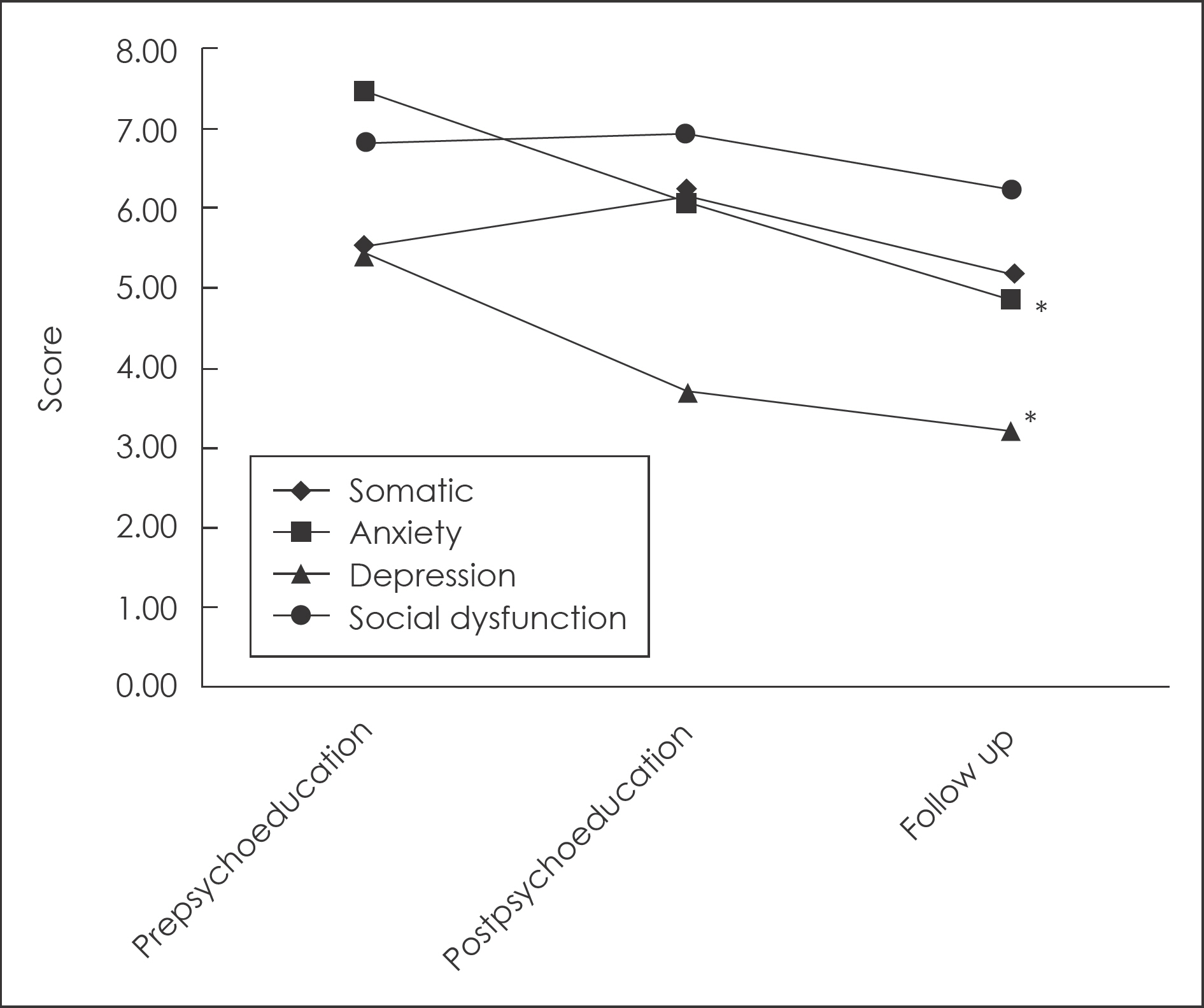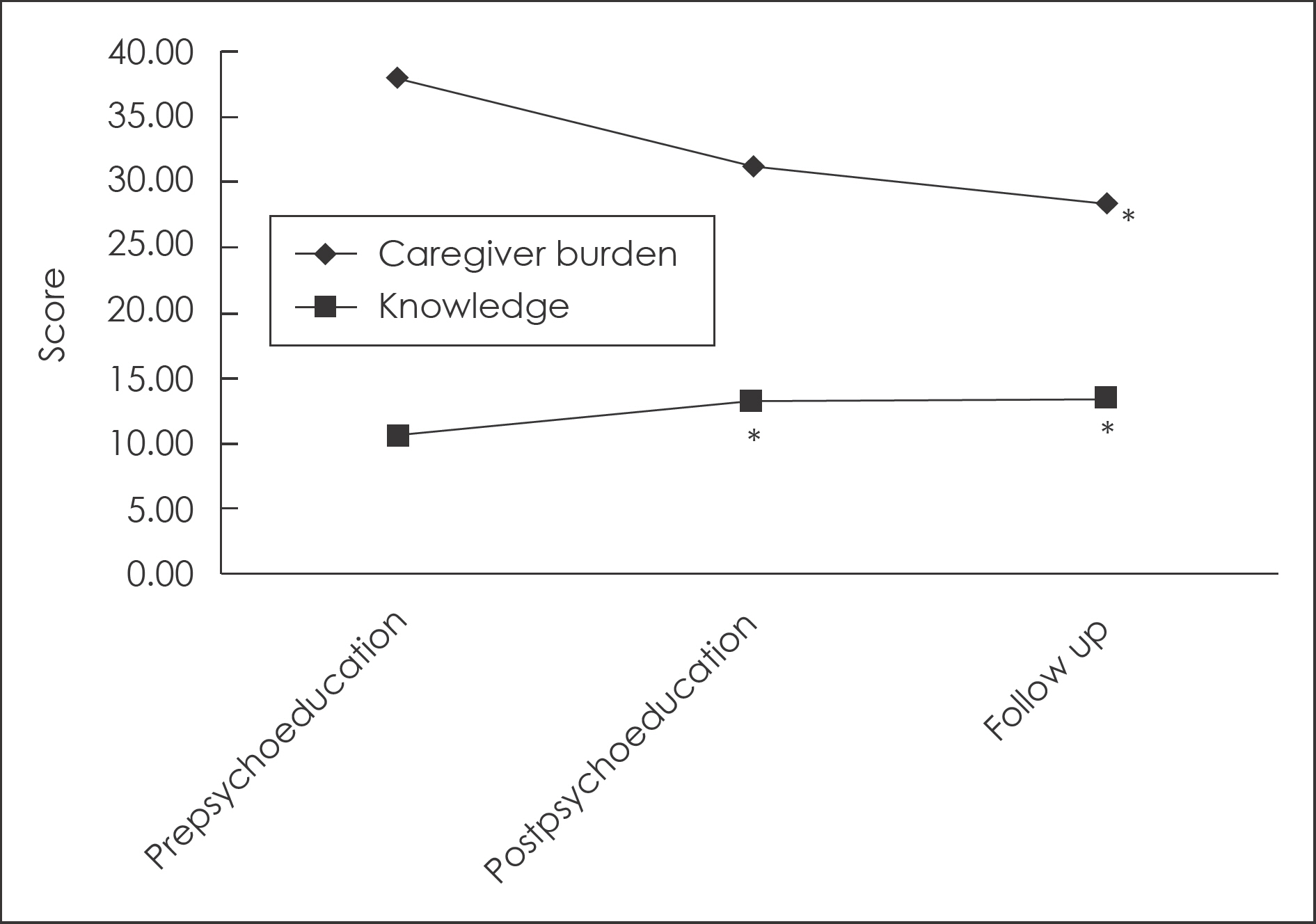Korean J Schizophr Res.
2013 Oct;16(2):62-68. 10.16946/kjsr.2013.16.2.62.
The Effect of a Short-Term Family Psychoeducation Program for Schizophrenia on Family Burden and Emotions Towards Patients
- Affiliations
-
- 1Department of Psychiatry, Busan Paik Hospital, Inje University College of Medicine, Busan, Korea. gabriel.jdu@gmail.com
- KMID: 2288325
- DOI: http://doi.org/10.16946/kjsr.2013.16.2.62
Abstract
OBJECTIVES
The aim of this study was to investigate continuously on how a short-term family psychoeducation program for schizophrenia would change the emotional stress and the knowledge of the family members.
METHODS
Subjects were the family members who participated in the short-term family psychoeducation program for schizophrenia. The participants were asked to fill out self-reporting forms for 3 times-before commencing the 6-week family education, immediately after completing the program, and 3 months after completing the program respectively.
RESULTS
A total of 46 subjects participated, and 20 of them responded to all questionnaires. Three months after the completion of psychoeducation, depression and anxiety subscale score among the General Health Questionnaire-28 decreased by 2.60 (p=0.04) and 2.20 (p=0.04) respectively. In caregiver burden criterion, the score decreased by 9.45 (p=0.04) in 3 months after completing the education. In knowledge about schizophrenia test, the score increased by 2.60 score (p<0.001), and this result was maintained after 3 months.
CONCLUSION
It was found that a short-term family education program for schizophrenia was effective not only in improving the knowledge on the disease but also in reducing anxiety and depression, and this effect was maintained immediately after the psychoeducation and so was it as time passed as well.
MeSH Terms
Figure
Cited by 1 articles
-
Developing a Prediction Model for Family Health in Families of Patients with Schizophrenia
Kuem Sun Han, Yeong Seon Hong, Hyuncheol Kang, Youn Hee Roh, Myung Sook Choi, Hee Jin Moon
J Korean Acad Psychiatr Ment Health Nurs. 2019;28(4):309-320. doi: 10.12934/jkpmhn.2019.28.4.309.
Reference
-
1). Lam DH. Psychosocial family intervention in schizophrenia: a review of empirical studies. Psychol Med. 1991; 21:423–441.
Article2). Agnes BH. Family education in mental illness. NY: Guilford Press;1990.3). Goldstein MJ. Psychosocial (nonpharmacological) treatment for schizophrenia. Vol 10. Washington DC: American Psychiatric Press;1991.4). Berkowitz R, Eberlein-Fries R, Kuipers L, Leff J. Educating relatives about schizophrenia. Schizophr Bull. 1984; 10:418–429.
Article5). Cozolino LJ, Goldstein MJ, Nuechterlein KH, West KL, Snyder KS. The impact of education about schizophrenia on relatives varying in expressed emotion. Schizophr Bull. 1988; 14:675–687.
Article6). Birchwood M, Smith J. Expressed emotions and first episodes of schizophrenia. Br J Psychiatry. 1987; 151:859–860.7). Tarrier N, Barrowclough C, Porceddu K, Watts S. The assessment of psychophysiological reactivity to the expressed emotion of relatives of schizophrenic patients. Br J Psychiatry. 1988; 152:618–624.8). Hogarty GE, Anderson CM, Reiss DJ, Kornblith SJ, Greenwald DP, Javna CD, et al. Family psychoeducation, social skills training, and maintenance chemotherapy in the aftercare treatment of schizophrenia. I. One-year effects of a controlled study on relapse and expressed emotion. Arch Gen Psychiatry. 1986; 43:633–642.9). Leff J, Kuipers KL, Berkowitz R, Eberlein-Fries R, Sturgeon D. Social intervention in schizophrenic families. Lancet. 1982; 2:1275.
Article10). Practice guideline for the treatment of patients with schizophrenia. American Psychiatric Association. Am J Psychiatry. 1997; 154(4 Suppl):1–63.11). Kreyenbuhl J, Buchanan RW, Dickerson FB, Dixon LB. The Schizophrenia Patient Outcomes Research Team (PORT): updated treatment recommendations 2009. Schizophr Bull. 2010; 36:94–103.
Article12). Treatment of schizophrenia 1999. The expert consensus guideline series. J Clin Psychiatry. 1999; 60(Suppl 11):3–80.13). Bhanji NH, Tempier R. Managing schizophrenia during the stable phase: is there consensus among practice guidelines? Can J Psychiatry. 2002; 47:76–80.
Article14). Lee YH, Shim JC, Lee SG, Seo YS, Kim YK, Kim KS, et al. Effect of a psychoeducational family therapy model for the families of schizophrenic patients. J Korean Neuropsychiatr Assoc. 2000; 39:479–494.15). Son JW, Kwon JS, Ha KS, Shin MS, Rhi BY. The effect of brief program of family education for families of inpatients with schizophrenia. J Korean Neuropsychiatr Assoc. 1996; 35:1279–1297.16). Hong SW, Lee BW, Lee SI. A study on psychological reaction and coping strategy in the family members of psychotic patients. J Korean Neuropsychiatr Assoc. 1994; 33:117–129.17). Kang DH, Kim CK, Byun WT. The objective and subjective family burden of schizophrenic patient. J Korean Neuropsychiatr Assoc. 1995; 34:193–203.18). McWilliams S, Hill S, Mannion N, Fetherston A, Kinsella A, O'Callaghan E. Schizophrenia: A five-year followup of patient outcome following psychoeducation for caregivers. European Psychiatry. 2012; 27:56–61.
Article19). Goldberg DP, Hillier VF. A scaled version of the General Health Questionnaire. Psychological Medicine. 1979; 9:139–145.
Article20). Friedrich F, Alexandrowicz R, Benda N, Cerny G, Wancata J. The criterion validity of different versions of the General Health Questionnaire among non-psychiatric inpatients. Soc Psychiatry Psychiatr Epidemiol. 2011; 46:635–641.
Article21). Goodchild ME, Duncan-Jones P. Chronicity and the General Health Questionnaire. Br J Psychiatry. 1985; 146:55–61.
Article22). Platt S. Measuring the burden of psychiatric illness on the family: an evaluation of some rating scales. Psychol Med. 1985; 15:383–393.
Article23). Kim CK, Cho JS, Seo JM, Kim YK, Kim HC, Kim HS, et al. A preliminary study for the development of the family burden scale of schizophrenics. J Korean Neuropsychiatr Assoc. 1999; 38:539–553.24). Compton MT, Quintero L, Esterberg ML. Assessing knowledge of schizophrenia: development and psychometric properties of a brief, multiple-choice knowledge test for use across various samples. Psychiatry Res. 2007; 151:87–95.
Article25). Jang MH. The Effect of the Structured Family Education on Knowl-edge·Attitude and Anxiety about Mental Illness for Families of Inpatients with Schizophrenia. Seoul: Kyunghee Univ. Press;1998.26). Lee JY. A study on effectiveness of family education program in lessening of the burden of the schizophrenia's family. Bucheon: Catholic Univ. Press;1995.27). Kim MJ, Jung SR. Family Education Program on the Knowledge and the Burden of Schizophrenia Patient's Family. J Korean Acad Psychiatr Ment Health Nurs. 2002; 11:273–284.28). Magliano L, Fiorillo A, Malangone C, De Rosa C, Maj M. Implementing psychoeducational interventions in Italy for patients with schizophrenia and their families. Psychiatr Serv. 2006; 57:266–269.
Article29). Goldstein MJ, Rodnick EH, Evans JR, May PR, Steinberg MR. Drug and family therapy in the aftercare of acute schizophrenics. Arch Gen Psychiatry. 1978; 35:1169–1177.
Article
- Full Text Links
- Actions
-
Cited
- CITED
-
- Close
- Share
- Similar articles
-
- Review of Group Family Psychoeducation for Schizophrenia and Recommendation of Program Applicable to Korean Situation
- The Effects of Social Skills Training vs. Psychoeducation on Negative Attitudes of Mothers of Persons with Schizophrenia: A Pilot Study
- Effects of Psychoeducation Program on Insight and Treatment Attitudes in Patients with Schizophrenia, Schizophreniform Disorder, and Schizoaffective Disorder
- Caregiver Burden in Schizophrenia and Autism Spectrum Disorders: A Comparative Study
- The Efficacy of a Short-Term Group Program for Treating Depressive Disorder in Female Adolescents: A Comparison of the Cognitive-Behavioral and Psychoeducation Programs: A Preliminary Study



